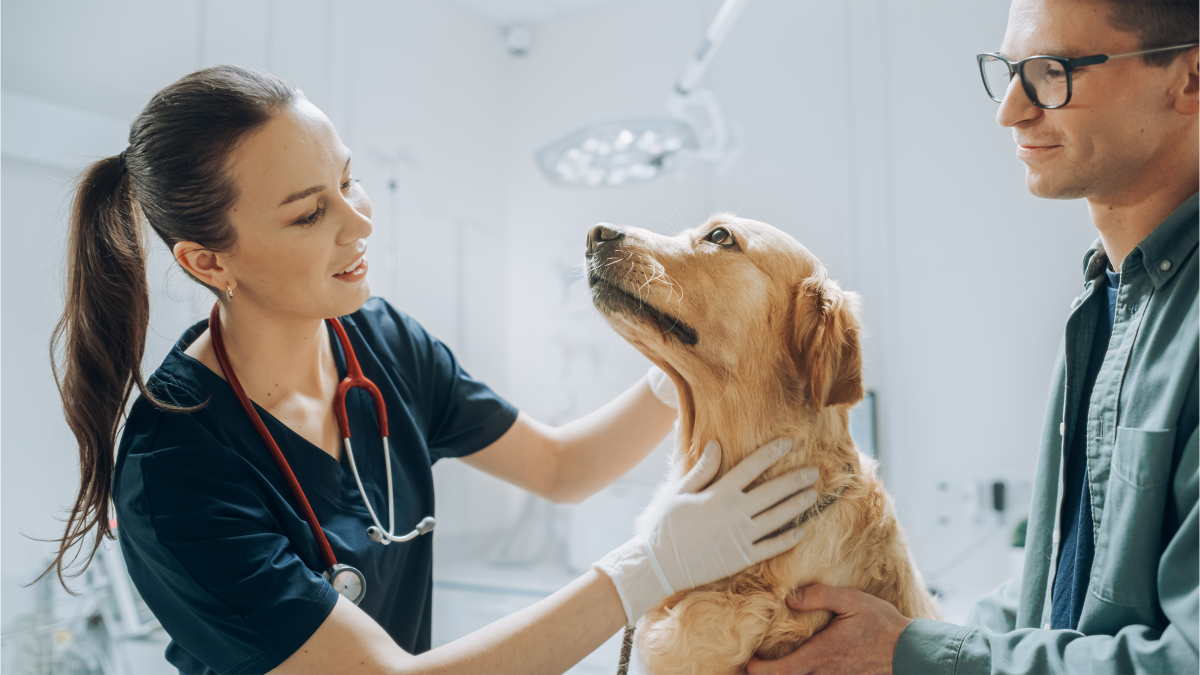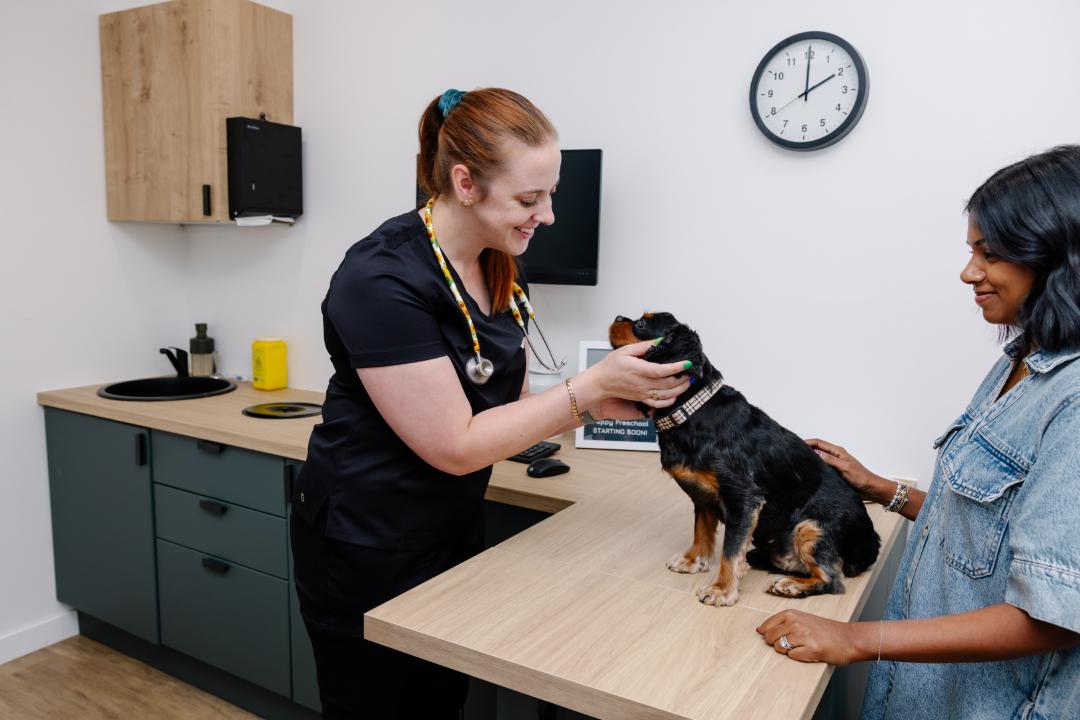Recognizing the Function of a Vet Behaviourist in Family Pet Training and Wellness
The role of a vet behaviourist is vital in attending to the elaborate connection between pets and their owners. They integrate vet medicine with understandings from animal actions scientific research to deal with concerns like hostility and anxiousness. Unlike conventional fitness instructors, their strategy concentrates on the underlying reasons of these habits. This nuanced viewpoint increases questions concerning the effectiveness of traditional training techniques and exactly how a much deeper understanding can change pet health. What strategies do they use to accomplish these outcomes?
What Is a Veterinary Behaviourist?
A vet behaviourist is a customized expert that concentrates on understanding and attending to the behavioral concerns of animals, especially family pets. Their competence combines vet medication and animal behavior science, allowing them to diagnose and treat a variety of behavioral issues - cat behaviourist near me. These professionals often hold innovative levels, such as a Master's or PhD in animal behavior, and are licensed by pertinent companies, guaranteeing they have a deep understanding of pet psychology
Vet behaviourists analyze pets through in-depth monitoring and analysis, thinking about factors such as genes, setting, and training history. They create tailored therapy plans, which may consist of desensitization methods, positive reinforcement approaches, and environmental modifications. Collaboration with family pet owners is crucial, as they supply advice and assistance throughout the training procedure. Eventually, the goal of a veterinary behaviourist is to enhance the well-being of the pet while cultivating a harmonious partnership in between pet dogs and their proprietors.
The Importance of Understanding Pet Actions
Comprehending pet actions is essential for both pet proprietors and specialists in the area of animal treatment, as it lays the foundation for effective communication and training. Acknowledging how animals regard their setting and reply to stimulations allows caregivers to produce a more unified living scenario. Understanding into behavior signs, such as body language and articulations, cultivates stronger bonds in between animals and their owners. By appreciating the natural impulses and requirements of different types, individuals can customize their training approaches to suit these aspects, advertising better knowing and participation. Additionally, a strong grasp of behavioral science aids in determining stressors and potential triggers, enabling proactive treatments. In general, recognizing animal habits not only improves the health of family pets but also enriches the experiences of those who take care of them, eventually bring about healthier, better relationships.
Usual Behavioral Issues Resolved by Veterinary Behaviourists
Veterinary behaviourists regularly address typical behavior problems in family pets, including aggression and concern feedbacks. They likewise focus on anxiety and tension monitoring, which can greatly influence a pet's well-being. Comprehending these issues is vital for developing effective training and treatment strategies.
Hostility and Anxiety Responses
While numerous pet dog proprietors may see aggressiveness and concern reactions as basic behavior problems, these complex responses commonly stem from underlying anxiousness or previous trauma. Vet behaviourists play a crucial function in determining the origin of these habits, which can show up in numerous forms, including growling, biting, or too much fear of specific circumstances. Understanding these triggers is essential for creating reliable training techniques tailored to each family pet's unique conditions. Behaviourists utilize methods such as desensitization and counter-conditioning to help pets handle their concerns and aggression. Furthermore, they enlighten animal owners regarding proper administration techniques, stressing the relevance of patience and consistency. Addressing aggressiveness and anxiety reactions not just boosts the pet dog's top quality of life but also strengthens the bond between family pet and proprietor.
Anxiety and Tension Administration
Anxiousness and tension prevail issues that numerous animals encounter, commonly arising from changes in their setting, absence of socialization, or previous unfavorable experiences. Vet behaviourists play an essential duty in identifying the underlying causes of these concerns. They employ numerous strategies, consisting of behavior modification, desensitization, and counter-conditioning, to aid pets take care of stress and anxiety. Furthermore, they may advise environmental changes, such as producing safe rooms or supplying enrichment tasks that promote relaxation. Partnership with pet proprietors is important, as behaviourists assist them in recognizing their pet dog's signals and applying efficient coping strategies. By dealing with stress and anxiety and anxiety, veterinary behaviourists contribute greatly to boosting the general health and high quality of life for animals and their families.
Exactly How Vet Behaviourists Vary From Traditional Fitness Instructors
Vet behaviourists differ from traditional instructors primarily in their educational histories and training. While conventional instructors frequently focus on obedience and standard commands, vet behaviourists stress understanding and addressing underlying behavioral concerns, including medical considerations into their strategy. This distinct emphasis allows them to give a more comprehensive therapy for pets with complicated behavior challenges.
Education And Learning and Training Distinctions
Comprehending the distinction in between vet behaviourists and typical trainers is necessary for family pet owners seeking efficient training solutions. Vet behaviourists possess sophisticated levels in veterinary medication, often followed by specialized training in pet behavior. This education equips them to address complex behavioral problems that may come from clinical conditions or psychological aspects. In contrast, typical instructors usually have certifications from training programs that concentrate on obedience and fundamental commands without diving into the underlying psychological or clinical elements. While both professionals intend to improve pet dog behaviour, vet behaviourists can detect and deal with behavioral problems holistically, incorporating medical understanding right into training approaches. This vital distinction highlights the importance of selecting the ideal professional based on the animal's details demands.
Focus on Behavioral Issues
Dealing with behavioral problems requires a nuanced strategy that identifies veterinary behaviourists from standard fitness instructors. While traditional trainers often concentrate on obedience and fundamental commands, vet behaviourists explore deeper right into the underlying sources of problematic behaviors. They utilize a considerable understanding of animal psychology and therapy techniques, which are rooted in scientific research. This proficiency enables them to determine problems originating from stress and anxiety, fear, or aggressiveness, instead of just addressing surface-level signs. In enhancement, veterinary behaviourists evaluate the animal's general well-being, considering ecological elements and the pet's history. By integrating clinical expertise with behavioral approaches, they offer customized options that promote long-lasting behavioral change, making certain both the animal's and proprietor's top quality of life are significantly boosted.
Clinical Considerations Included
While conventional fitness instructors might ignore underlying medical issues, veterinary behaviourists prioritize a detailed evaluation of a pet's wellness as a fundamental action in addressing behavioral troubles. This method allows them to determine prospective medical conditions that might add to unfavorable practices, such as anxiousness, discomfort, or neurological disorders. By incorporating clinical analyses into their technique, vet behaviourists Continue can collaborate with veterinarians to guarantee an all natural understanding of the pet's well-being. In addition, they can advise suitable therapies or adjustments to training strategies based on clinical findings. This extensive point of view distinguishes veterinary behaviourists from traditional instructors, as they attend to both behavioral and health-related variables, eventually bring about extra efficient and lasting outcomes for animals and their owners.

The Refine of Working With a Vet Behaviourist
Collaborating with a veterinary behaviourist entails an organized strategy to attending to a pet's behavioral concerns. Originally, the procedure starts with an extensive evaluation, where the behaviourist collects in-depth info regarding the animal's background, atmosphere, and specific habits that are bothersome. This commonly consists of sets of questions, interviews with the pet owner, and sometimes observations of the pet dog in its setting.
Adhering to the analysis, the vet behaviourist develops a tailored treatment strategy that might consist of behavioral adjustment strategies, training techniques, and, if necessary, recommendations for clinical assessments. veterinary behaviour. The strategy is made to be practical and achievable, ensuring that it fits seamlessly into the family pet owner's way of life
Succeeding follow-up sessions are necessary to check development, adjust methods, and offer support. This collaborative initiative not just aims to customize unwanted behaviors yet additionally to boost the overall health of the pet dog, guaranteeing an unified connection in between the family pet and its owner.
Enhancing Your Pet dog's High quality of Life With Behavioral Support
Enhancing an animal's lifestyle with behavioral support is essential for cultivating a healthy and balanced and fulfilling connection between family pets and their proprietors (canine behaviourist near me). Veterinary behaviourists play an important role in identifying and resolving behavior concerns that may hinder a family pet's well-being. Via customized approaches, they help minimize visit this web-site anxiety, concern, and hostility, inevitably advertising a more balanced and satisfied animal
Behavior assistance incorporates numerous methods, consisting of favorable support, ecological enrichment, and socializing. By executing these methods, owners can develop a caring setting that motivates positive habits. This not only improves the animal's emotional wellness yet additionally enhances the bond between pet dog and owner.
In addition, regular consultations with a vet behaviourist guarantee that any emerging behavior worries are promptly resolved, avoiding escalation. On the whole, purchasing behavioral support is a proactive method that greatly improves a family pet's life, leading to boosted physical and psychological health results.
Regularly Asked Questions
What Qualifications Do Veterinary Behaviourists Possess?
Veterinary behaviourists usually hold a veterinary level, complied with by specialized training in pet behavior. Numerous also possess qualifications from recognized companies, demonstrating their expertise in dealing with animal actions problems and advertising total animal health.
Can Vet Behaviourists Prescribe Medicine for Family Pets?


Veterinary behaviourists, having vet degrees and specialized training, can undoubtedly prescribe drug for family pets. This ability enables them to resolve underlying behavioral issues properly, commonly combining pharmacological treatment with behavior modification strategies for finest outcomes.
The Length Of Time Does Behavioral Therapy Commonly Take?
Behavior treatment duration varies considerably, typically varying from a few weeks to several months. Variables influencing this timeline consist of the pet dog's certain concerns, uniformity of training, and the owner's engagement while doing so.
Are Remote Examinations Readily Available With Veterinary Behaviourists?

How Much Does a Veterinary Behaviourist Examination Expense?
The cost of a veterinary behaviourist examination typically varies from $100 to $300, depending upon factors such as area, experience, and session size. Extra charges might request follow-up assessments or specialized solutions.